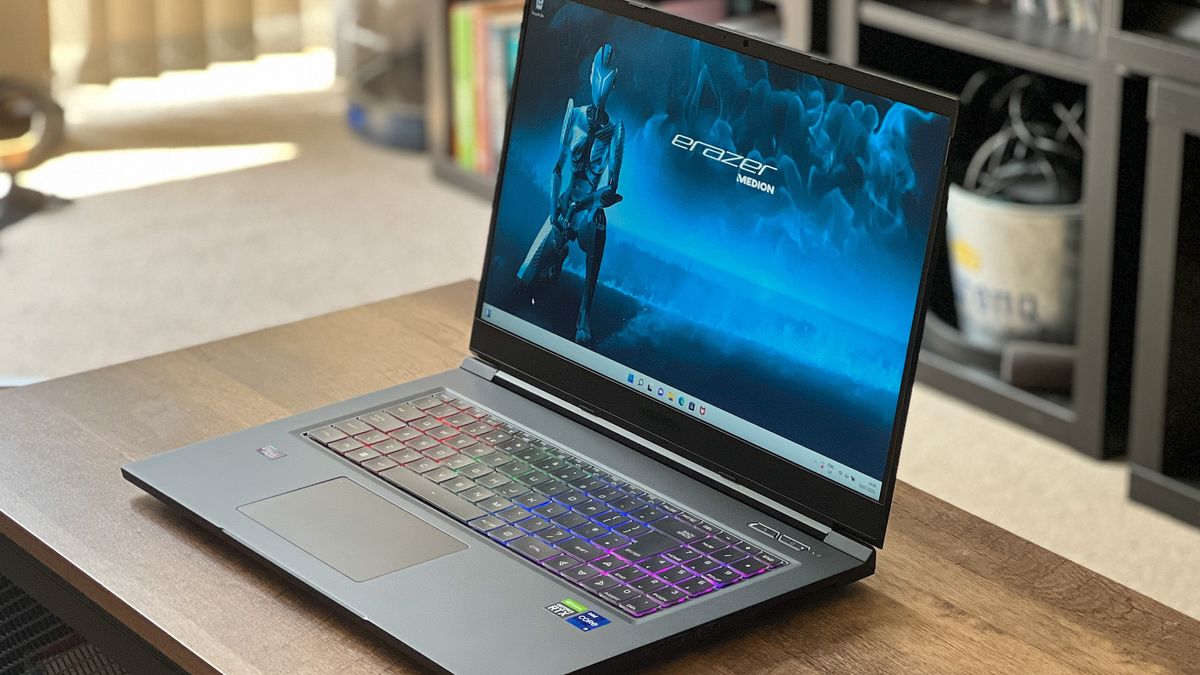12DOVE Verdict
The Medion Erazer Beast X30 is a premium gaming laptop for those who don't want to pay super premium prices. Packing the latest and greatest components and the engineering to help them shine, this is a real sight to behold. There's not much better value on the market in the £2,000 - £3,000 price range right now, but this one's just for UK and Europe unfortunately.
Pros
- +
Excellent spec sheet for the price
- +
Promising performance
- +
Slimline design
- +
Crisp, clear QHD display
Cons
- -
Not available in the US
- -
Runs loud when under pressure
Why you can trust 12DOVE
The Medion Erazer Beast X30 is here to take over from the previous generation X25 model, and with the same slimline design in a massive 17.3-inch chassis, there's plenty to love. Medion machines are well known for their affordable price tags, cramming mid-range to upper mid-range components into a durable shell and coming in way under the cost of big-name brand competitors. The X30 hits a little different.
Packing Intel's latest 12th generation processors and Ti models of Nvidia's most powerful graphics cards, there's some serious grunt under the hood here. That £1,799 starting price, however, is incredibly fair given the going rates of these kinds of configurations in the best gaming laptops on the market. That's still nearly £2K, though, and our RTX 3080 Ti unit clocks in at a higher £2,699, so we put the Medion Erazer Beast X30 to the test to make sure you're still investing in all the right places.
There is one caveat before we begin. Yes, this is an excellent machine - but it's currently not available in the US. We'll keep this review updated should that market change, however.
Design
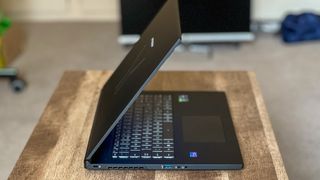
Medion is subscribing to the design trends of the current gaming laptop landscape here. The Erazer X30 calls upon the matte black aesthetic of the Razer Blade 15, albeit with a slightly less luxurious chassis feel. That's not to say this rig feels cheap - in fact, I was surprised by just how solid the main plate is and how little flex there is in that display. However, that black runs just a little deeper on the Blade and you're dropping that impressive anti-fingerprint coating here which means things might not look pristine for too long.
Of course, you're not paying the Razer tax here, and Medion has still outfitted this rig with an all-metal chassis, impressive build quality with no snagging parts, and a feel of solid durability overall. Positioning ports along the back is an easy way to my heart, and the Erazer helpfully keeps its power, HDMI, USB-C, and LAN connections to the rear of the device making for a much tidier setup to boot. You'll also find two USB-A ports and an SD card reader along the right-hand side, and a third USB-A with 3.5mm audio out and mic input jacks on the left. Slotting these ports into my existing setup was particularly easy, with plenty of flexibility in that layout.
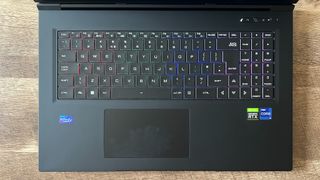
There's a full-size keyboard planted on top of the main plate, with a number pad and select functions accessed through secondary keys as well. Power is separated from the main deck, with an additional turbo function button situated next to it. It's no biggie, but if you prefer to keep your power button separate from your keyboard that's a big bonus, and if - like me - you hate diving into menus to set your machine's profile, that dedicated button is going to come in very handy as well.
Features
Processor: Intel i9-12900HK
Graphics: Nvidia GeForce RTX 3080 Ti
Memory: 32GB LPDDR5 RAM
Display: 17.3-inch, 240Hz
Resolution: 2560 x 1440 (QHD)
Storage: 1TB PCIe NVMe M.2 SSD
Ports: 1x USB Type A 3.2 Gen 2, 2x USB Type A 3.2 Gen 1, 1x USB-C with Thunderbolt 4, 1x HDMI 2.1, 1x Gigabit Ethernet, 2x 3.5mm audio, MicroSD card reader, power
OS: Windows 11
Weight: 2.2kg (4.85lbs)
Medion hasn't pulled any punches putting its latest spec sheets together. Our test unit runs an Intel i9-12900HK processor, RTX 3080 Ti GPU, 32GB RAM, and 1TB SSD. That's a spec that will run you around £2,699 all told. That sounds like a lot, but very few 17.3-inch rigs are packing these kinds of specs right now and Razer's closest Blade 17 offers an RTX 3070 Ti with half the RAM for £3,399.99. Drop down the price scale and you're losing nearly all of those high-end features. The nearest you'll get to this kind of power from a budget MSI Katana, for example, is an RTX 3070 Ti GPU, i7-12700H processor, 16GB RAM, and a 144Hz 1080p panel at £1,699.99.
This is a feature set designed to hit a sweet spot that not many can hit these days. Those on the hunt for premium kit are already resigned to prices totaling well over £2,500, but when every single box is ticked those costs are far more likely to surge to £3,000. This is a gaming laptop for the budget-minded among the high-end users, packing topline specs into a (relative to the market) affordable price tag.
The port selection supports this focus on high-end gaming, with Thunderbolt 4 built into the back USB-C and a USB 3.2 Gen 2 on the left-hand side (along with the two USB 3.2 Gen 1 connections on the right). Medion has also included a webcam but, as with all in general, it's not going to be your mainstream driver. While it holds its own video calls, colors are particularly washed out here and the overall picture remains fuzzed.
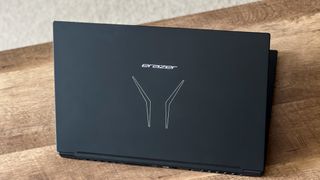
I was pleasantly surprised by the Medion keyboard. The ever so slightly concave keys make for a comfortable typing experience, and though travel distance is light there's still plenty of satisfaction in hitting each one. There's also four-zone RGB packed in here, which actually shines surprisingly well compared to other high-end options.
The cherry on top of this cake is that 240Hz QHD display, proving that you're really not sacrificing anything to secure yourself topline specs without leaning into investment-level pricing. Everything is fast, crisp, and well-balanced here, though brightness isn't quite up to the level of more expensive machines.
Performance
Fire Strike: 26,542
Time Spy: 12,049
PC Mark 10: 7,369
Cinebench (Multi): 18,589
Crystal Disk Mark: 6628 MB/s read; 5190 MB/s write
Running in the standard Game Mode, the Medion Erazer certainly impressed with its numbers. I conducted real-world and industry-standard tests using the system's own preset Game Mode configuration, but the Medion Control Centre also allows you to tailor this experience to push or quieten your experience.
Safe to say, you're getting some serious power here, that will blow the similarly priced competition out of the water. A multi-core test on Cinebench yielded an incredible 18,589 score (jumping up as high as 18,931 in some tests) and PC Mark 10 scores corroborated these tests, pitting the Medion Erazer at 7,128 - trailing slightly behind the likes of the i7-12700H Alienware M15 R7 but only just tailing the i9-12900H Razer Blade 15.
In-game performance was similarly impressive. I was firing up complex Cities Skylines and Planet Coaster save files without as much as a drop of sweat from the Medion. This beast handled QHD Ultra gameplay without dropping below 60 FPS on titles like Shadow of the Tomb Raider and The Division 2, even managing to maintain over 100 FPS in 1080p on Red Dead Redemption 2 as well.
There is one drawback to packing such high-end components into a more budget-friendly chassis. While temperature is not too much of a concern, surprisingly, those fans can kick up a storm. We all know gaming laptops are loud, but the Medion Erazer Beast X30 is a particularly deafening example. Running in QHD resolution with everything turned up to 11 (and Turbo mode at full pelt) you'll see some gorgeous pictures, but your ears will be ringing. That said, Office mode is whisper quiet during everyday tasks, and Game Mode will only kick up a fuss during particularly strenuous moments.
| Header Cell - Column 0 | High | Highest / Ultra |
|---|---|---|
| Shadow of the Tomb Raider | 1080p @ 156fps; 1440p @87fps | 1080p @ 93fps; 1440p @ 82fps |
| Total War: Three Kingdoms | 1080p @ 132fps; 1440p @ 82fps | 1080p @ 84fps; 1440p @ 59fps |
| Red Dead Redemption 2 | 1080p @ 132fps; 1440p @ 65fps | 1080p @ 110fps; 1440p @ 58fps |
| Metro Exodus | 1080p @ 97fps; 1440p @ 83fps | 1080p @ 82fps; 1440p @ 67fps |
| The Division 2 | 1080p @ 159fps; 1440p @ 84fps | 1080p @ 126fps; 1440p @ 68fps |
Should you buy the Medion Erazer Beast X30?
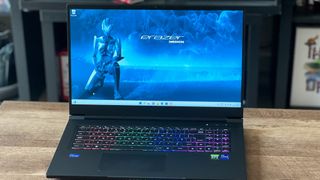
There's one major caveat to the Medion Erazer Beast X30, and that's that you won't find it easily in the US. This is a UK and mainland Europe machine, with very little stock available stateside. If you're browsing in the US, we'd recommend checking out other budget options that still manage to pack some powerful components - the Acer Nitro 5 being our top pick.
However, if you're in the UK and you're looking to top the spec sheet without breaking past £3,000 the Medion Erazer Beast X30 should certainly be on your priority list. This is one of the best-value gaming laptops on the market right now, within this specific price bracket and while its main player base will be limited, those who do fit this niche will need to know about the power on offer here.
The Razer Blade 15 offers a similar power proposition, with some aesthetic upgrades and beautification. If you'd prefer to pay considerably over for such a lifestyle piece, then it's a worthy recommendation.
How we tested the Medion Erazer Beast X30
I used the Medion Erazer Beast X30 as my main gaming laptop for a period of two weeks, testing the system across all my everyday games (currently Planet Coaster, Cities Skylines, and Shadow of the Tomb Raider). I also ran industry-standard tests to push the CPU, GPU, and SSD to their limits, while running in-game benchmarks in Shadow of the Tomb Raider, Total War: Three Kingdoms, Red Dead Redemption 2, Metro Exodus, and The Division 2. I also used the Medion Erazer as my main work laptop over a period of two days, testing the system across a range of productivity uses as well. You can find out more about how we test gaming laptops through our dedicated 12DOVE Hardware Policy.
We're also rounding up all the best Razer laptops and the best Alienware laptops for more options. Or, check out our guide to this week's cheap gaming laptop deals for savings across the full price range.

Managing Editor of Hardware at 12DOVE, I originally landed in hardware at our sister site TechRadar before moving over to GamesRadar. In between, I've written for Tom’s Guide, Wireframe, The Indie Game Website and That Video Game Blog, covering everything from the PS5 launch to the Apple Pencil. Now, i'm focused on Nintendo Switch, gaming laptops (and the keyboards, headsets and mice that come with them), PS5, and trying to find the perfect projector.
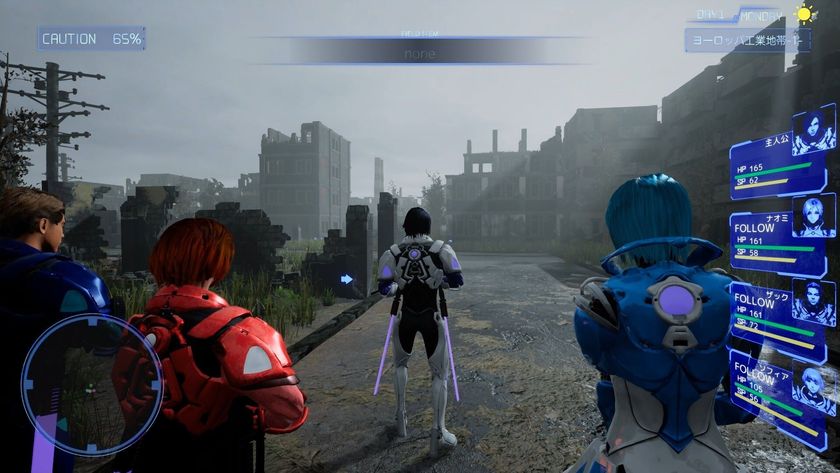
Persona and Metaphor: ReFantazio composer's new JRPG gets a Steam Next Fest demo, and it's basically a turn-based Metal Gear Solid
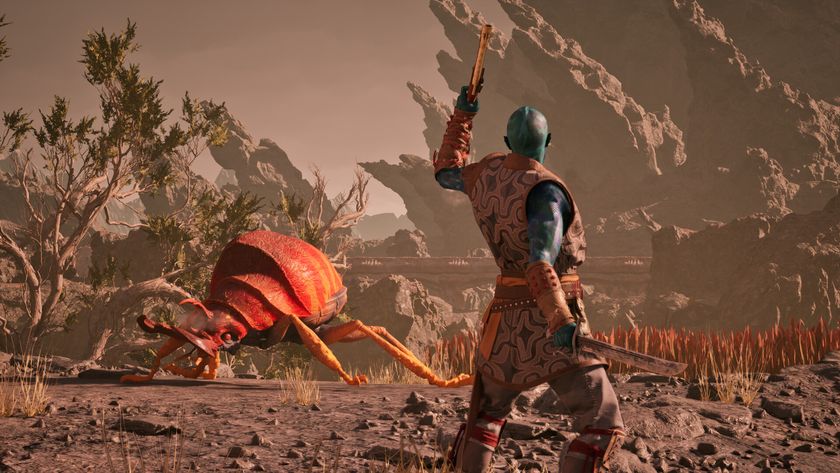
Avowed is nothing like Bethesda's RPGs, but The Elder Scrolls 6 should take inspiration from its combat
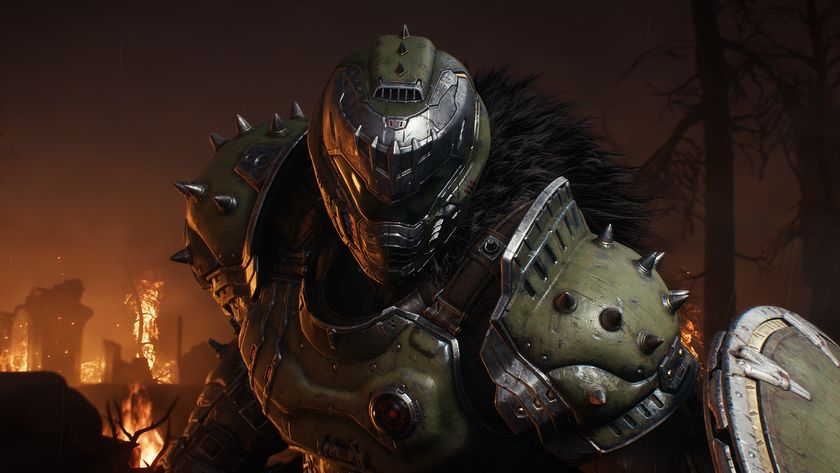
Doom: The Dark Ages developers go back to the OG 1993 FPS for inspiration: "Every time you look at it, you learn something new"
Most Popular





